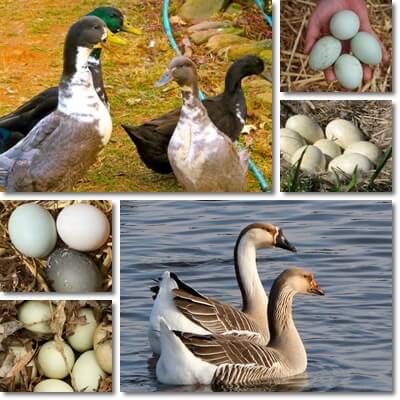Goose and duck eggs are two egg varieties most people are unfamiliar with and those that are familiar with them avoid them because of their high cholesterol content. But what they don’t know is that goose and duck eggs don’t just have more cholesterol, they also have more of several vitamins and minerals, which adds to their health benefits. Compared to chicken eggs, goose and duck are actually more nutritious, providing significantly more protein, iron, vitamin B12 and folic acid. At the same time, they also have a higher cholesterol and fat content as well as energetic value.
Overall, duck and goose eggs have an excellent nutritional value and are a great addition to your diet if consumed in moderation, as part of an overall healthy, balanced and varied diet. The high fat content is only problematic if you eat too much or have pre-existing conditions that restrict your fat or caloric intake.

For example, having diabetes or high cholesterol means you should eat less fats overall, despite some experts recommending eating no eggs because they provide a lot of fat. Eggs in moderation are actually a far better choice than processed foods such as cold cuts, salami, sausages and deli meats in general. If you don’t have any pre-existing conditions, then you could benefit from eating limited amounts of goose or duck eggs because even the fats and cholesterol they contain have nutritional value and will contribute to various aspects of your health.
And the question remains: which is better for your health, duck or goose eggs? Depending on your individual nutritional requirements, level of physical activity and any existing health conditions such as obesity or high cholesterol, you could benefit more from eating either goose or duck eggs, or neither, or just the egg whites instead of the whole eggs. In any case, intake should be limited and reasonable.

Which is better between goose and duck eggs?
Overall, there are a few nutritional aspects to consider when looking to compare goose eggs and duck eggs in order to decide which of the two is better for you.
Goose and duck eggs are high in cholesterol, but goose eggs are higher
Goose eggs have more cholesterol than chicken, quail and duck eggs. A serving of only 100 g of goose egg, which is less than 1 whole egg, has almost as much cholesterol as one and a half duck eggs. And to give you a better idea of you just how much cholesterol there is in goose eggs, know that one chicken egg has 186 mg of cholesterol, 1 duck egg has 619 mg of cholesterol while one goose egg has 1230 mg of cholesterol. And the maximum recommended daily intake of cholesterol for the average adult is just 300 mg.
What this means is that, if you do decide to choose goose over duck eggs, it would be healthiest to eat them infrequently. Duck eggs can be eaten more frequently, but still not every day as they too are high in cholesterol. But even if you sometimes have a higher intake of cholesterol than recommended, don’t worry. Emerging studies suggest that dietary cholesterol doesn’t directly and immediately raise blood cholesterol levels.
High blood cholesterol is more of a side effect of an overall poor diet, rich in processed foods high in fats, sugars and calories, and a result of months or years of bad eating rather than just having two more eggs per week. Moreover, cholesterol has important nutritional value and is a source of significant benefits for health. For example, cholesterol helps build the protective coating insulating the tail of nerve cells, and is used by the body to make vitamin D, hormones for growth and fertility, and other benefits.
Goose and duck eggs are both high in fat and calories
Both goose and duck eggs are high in fats and calories, with most of the calories coming from the fats in the egg yolk. The varieties have both saturated and unsaturated fat, small amounts of these fats being healthy Omega-3 fatty acids.
How much fat in goose and duck eggs?
- Goose eggs have 13.27 grams of fat per 100 g and 19.11 grams of fat per egg (estimated weight of one goose eggs: 144 g). Of the total fat content in goose eggs, 3.6 grams are saturated fat, 5.7 grams are monounsaturated fat, and 1.7 grams are polyunsaturated fat.
- Duck eggs have 13.77 grams of fat per 100 g and 9.64 grams of fat per egg (estimated weight of one duck egg: 70 g). Of the total fat content in duck eggs, 3.7 grams are saturated fat, 6.5 grams are monounsaturated fat, and 1.2 grams are polyunsaturated fat.
How many calories in goose and duck eggs?
- Goose eggs have 185 calories per 100 grams and 266 calories per egg (weight: 144 grams).
- Duck eggs have 185 calories per 100 grams and 130 calories per egg (weight: 70 grams).
If you are overweight or obese, suffering from diabetes, high blood cholesterol, high blood pressure or other medical conditions that would not benefit from a high intake of fats or calories, then neither goose or duck eggs are a good choice for you. Unless you clean up your diet and they are the only sources of fats you eat, in limited amounts of course.
If you do not have any medical conditions that would be impacted by egg consumption, then restricting intake to reasonable amounts and eating the egg varieties more infrequently would mean that both goose and duck eggs can make a wonderful addition to your diet.
Some of the biggest benefits of eating goose and duck eggs include:
- providing nourishment for the brain – eggs are an ideal food during periods of intellectual effort
- reducing brain fog for clearer thinking and improved productivity
- protection against degenerative diseases of the nervous system – the fats in goose and duck eggs, namely Omega-3 and cholesterol in the yolk, and vitamin B12 protect the insulating myelin sheath coating surrounding the tail of nerve cells and play a vital role in reducing the risks of degenerative nervous system diseases such as Alzheimer’s and multiple sclerosis.
Goose and duck eggs are similarly high in vitamin B12
Goose and duck eggs are equally good sources of the essential vitamin, with duck eggs having just slightly more vitamin B12 than goose. How much vitamin B12 in goose and duck eggs?
- Goose eggs have 5.10 micrograms (mcg) of vitamin B12 per 100 g and 7.34 mcg per egg
- Duck eggs have 5.40 micrograms (mcg) of vitamin B12 per 100 g and 3.78 mcg per egg
- Current recommended daily intake (RDI) of vitamin B12 for the average adult: 2.4 micrograms (mcg).
Half a goose egg and less than one duck egg provide all the vitamin B12 you need in a day. And the benefits that come with it include:
- Production of red blood cells to oxygenate tissues, higher energy levels and a boost in vitality.
- In pregnancy, getting enough vitamin B12 helps combat anemia, tiredness and fatigue in the pregnant woman, and helps prevent birth defects in the baby.
- Reduced risks of degenerative diseases of the nervous system such as multiple sclerosis. Vitamin B12, and cholesterol and other fats, help maintain the integrity of the insulating myelin sheath surrounding the tail of nerve cells.
Goose and duck eggs are equally good sources of folate and iron
Both egg varieties provide important amounts of both vitamin B9 (folate) and iron with benefits for pregnant women, athletes, anemia sufferers and anyone looking to up their intake of the two essential nutrients to combat tiredness and lack of vitality. To give you a better picture of the vitamin B9 and iron content of the two egg varieties, one and a half duck eggs or just three quarters of goose egg provide a little over 20% of the recommended daily intake (RDI) of vitamin B9 and iron for an average adult.
How much folate or vitamin B9 and iron do you need per day?
- The current RDI is 400 micrograms (mcg) of folate and 18 milligrams (mg) of iron
How much folate or vitamin B9 and iron in goose eggs and duck eggs?
- 1 goose egg (144 g) has 109 micrograms (mcg) of folate or vitamin B9 and 5.24 milligrams (mg) of iron
- 1 duck egg (70 g) has 56 micrograms (mcg) of folate or vitamin B9 and 2.69 milligrams (mg) of iron
- 100 g of goose egg has 76 micrograms (mcg) of folate or vitamin B9 and 3.64 milligrams (mg) of iron
- 100 g of duck egg has 80 micrograms (mcg) of folate or vitamin B9 and 3.85 milligrams (mg) of iron
What are the benefits for health of vitamin B9 (folate) and iron in goose and duck eggs?
- Elevate energy levels and combat fatigue.
- Restore vitality and counteract lethargy, improve mood.
- Help produce red blood cells and support blood circulation.
- Prevent birth defects in newborns: congenital heart defects and neural tube defects.
- Good for pregnant women – vitamin B9 and iron in goose and duck eggs combat fatigue in pregnancy, support the expanding circulatory system of the pregnant woman.
- Prevent and help manage and correct anemia caused by iron deficiency and vitamin B9 deficiency.
- Boost in fertility.
- Stronger immune system.
Also see what are the 23 biggest benefits of goose eggs for health.
Goose eggs are higher in protein
Both goose and duck eggs are naturally high in protein. The following values apply:
How much protein in goose eggs?
- 1 goose egg (144 grams): 19.97 grams of protein
- 100 grams of goose egg: 13.87 grams of protein
How much protein in duck eggs?
- 1 duck egg (70 grams): 8.97 grams of protein
- 100 grams of duck egg: 12.81 grams of protein
The recommended daily intake (RDI) of protein is 50 grams a day. What this means is that one whole goose egg provides 40% of all the protein you need in a day, while one duck egg provides approximately 21% of your protein requirements. And the benefits that come with eating either egg variety include:
- Nourishment for the brain, supporting intellectual effort, memory and learning.
- Clearer thinking, reduced brain fog and improvement of mood swings.
- Boost in motivation and increased productivity.
- Facilitating muscle growth and achieving good muscle tone.
- Benefits for the immune system such as producing antibodies, and a better immune system response.
- Stronger hair and healthy skin, benefits for wound healing.
- Production of red blood cells and synthesizing hormones and vitamins.
Other nutritional facts
Both goose and duck eggs are powerhouses of nutrition, with a dense nutritional value. The two varieties are good sources of potassium and phosphorus which makes them good for high blood pressure management and bone health.
Other vitamins, minerals and nutrients found in goose and duck eggs include calcium, magnesium, sodium, zinc, vitamins A, D, E, choline, and B vitamins such as vitamins B1, B2, B3, B5 and B6. Neither goose, nor duck eggs have any dietary fiber or vitamin C, and only very small amounts of carbohydrates and sugars. Omega-3 fatty acids is variable, depending on the diet of the birds, but both goose and duck eggs are high in selenium for thyroid health, with goose eggs being higher in the mineral.
Find out more about the nutrition of goose eggs.
Conclusion
Both goose and duck eggs boast a similar nutritional profile and are two highly nourishing foods, providing particularly high amounts of protein, fats, cholesterol, vitamins B12, B9, iron, and a high energetic value. Overall, unless you have any dietary restrictions brought on by pre-existing medical conditions, eating moderate amounts of both goose and duck eggs infrequently could benefit multiple aspects of your physical and mental health.
